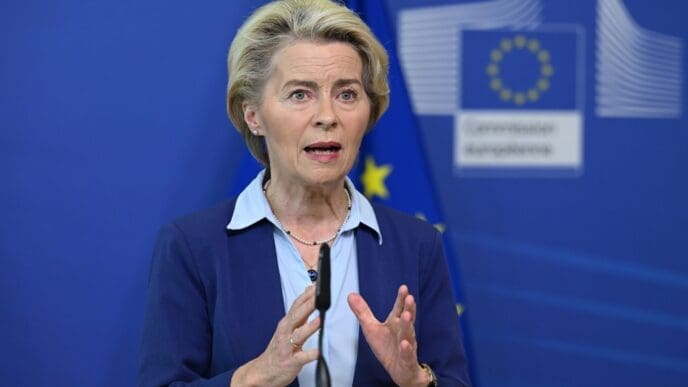The European Union is currently navigating internal disagreements over how to respond to the United States’ imposition of tariffs, as discussions about potential negotiations with the US are underway. Within the EU, a divide has surfaced between those advocating for a strong, unified response and others urging caution to avoid economic repercussions. This debate centers on the appropriate intensity and scope of the EU’s retaliatory measures.
Some EU member states are pushing for robust countermeasures to demonstrate strength in negotiations with the US. These measures could include imposing tariffs on American goods and services and employing an anti-coercion tool to restrict US companies’ access to European markets. France, in particular, is at the forefront of advocating for a firm response, with President Emmanuel Macron criticizing US tariffs as unjustified and proposing a temporary suspension of French investments in the US. French officials are actively seeking a more aggressive stance, including potential actions against US services and intellectual property rights.
Germany, as the EU’s largest exporter to the US, has also been significantly affected by the tariffs. Initially favoring a moderate approach, Germany has aligned with France in considering the use of the EU’s trade defense mechanisms if necessary. German officials emphasize the need for decisive action, citing the potential for further economic damage if the situation escalates.
Spain’s Prime Minister Pedro Sánchez initially adopted a firm stance against US tariffs, advocating for proportional countermeasures and European unity. However, following a temporary tariff truce announced by President Trump, Sánchez has shifted towards a more conciliatory approach, emphasizing dialogue and international cooperation.
Within the EU, some member states prefer a diplomatic approach to avoid escalation. Italy, for example, favors dialogue over confrontation, with Prime Minister Giorgia Meloni planning to discuss tariff elimination with President Trump. Ireland, too, advocates for negotiation, recognizing its economic vulnerability due to substantial export ties with the US.
Hungary stands out as an exception, having voted against the initial EU retaliatory measures. Hungarian officials hope for a favorable economic agreement with the US, despite the impact of tariffs on their economy, particularly in the automotive sector.
The Bottom Line
The ongoing debate within the EU regarding its response to US tariffs highlights the complexities of international trade relations. The differing perspectives among member states reflect varying economic vulnerabilities and strategic priorities. For the general public, the outcome of these discussions could influence consumer prices and the availability of goods and services. Businesses, especially those involved in transatlantic trade, may face uncertainty as they navigate potential changes in tariffs and trade policies.
For consumers, the possibility of increased tariffs on US goods could lead to higher prices for certain products, affecting daily expenses. Additionally, any escalation in trade tensions might impact job opportunities in industries reliant on exports. The situation underscores the interconnectedness of global economies and the importance of diplomatic efforts to maintain stable trade relationships.












